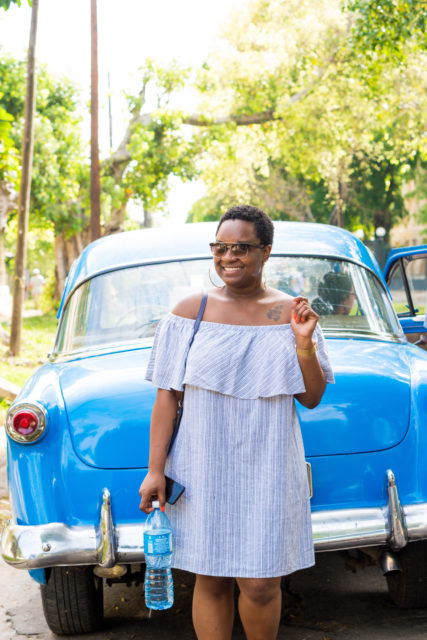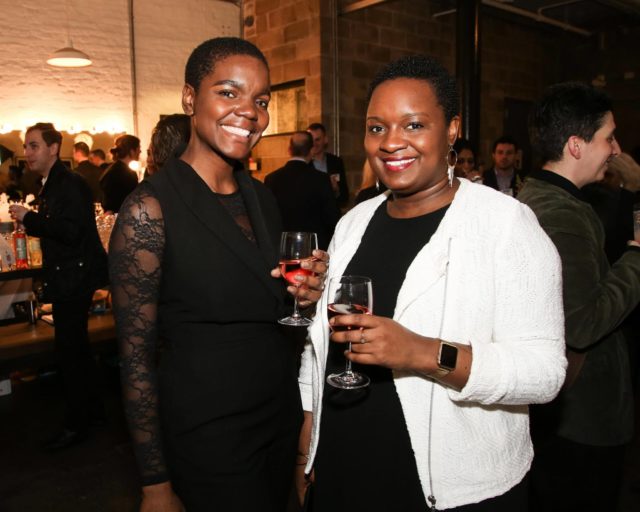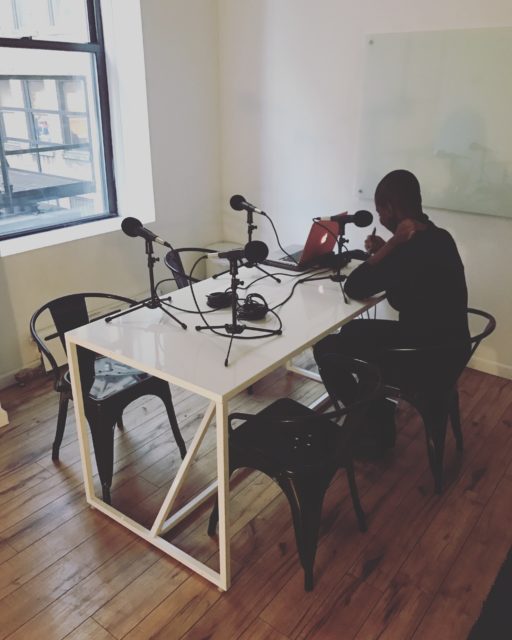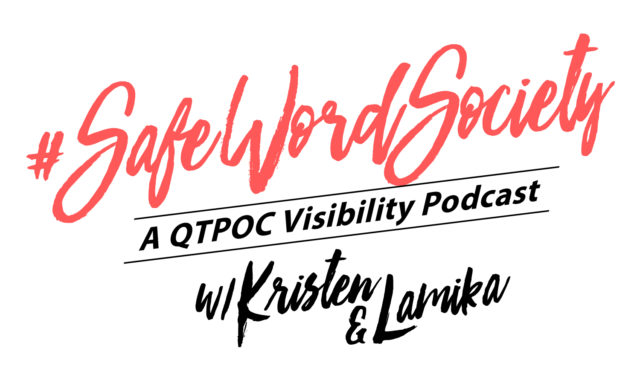#SafeWordSociety is a weekly podcast that is equal parts entertaining and educational. Project creator and host Kristen McCallum – along with her co-host Lamika Young – “use interviews & discussions with thought leaders, influencers and everyday people to navigate the authenticity of identity.” Touching on topics like bi-visibility, queer marriage, how to handle the comments section and non-binary identities these two have created a space where QTPOC can feel represented and heard.
Listening to their podcast feels like you’re in the living room chatting with friends over a glass of wine or brunch. With each episode you get to meet QTPOC who are making waves and creating change in the community – whether through style, advocacy or healthcare – they cover everything on #SafeWordSociety. With the podcast quickly growing Kristen and Lamika are making waves of their own. I met up with Kristen at a local BedStuy coffee shop to learn more about this podcast that has been growing like wildfire.

GO Magazine: What was the genesis of the podcast?
Kristen McCallum: I had thought about podcasting for a really long time mainly because I’m shy – well, I need to stop saying that because I’m not that shy anymore. I wanted to have discussions without necessarily having to be on camera. I thought about it for a really long time and I don’t really listen to podcasts that much and I kept thinking about how hard it must be for people to do. But then I thought, well me and my friends have brunch and we get into these really intense conversations that no one ever hears after that moment. So I was like what if I made the podcast very low-key and just have the same conversations we already have and just record it.
GO: How do you approach representation in your content?
KM: When it comes to the episodes and who I want to be on them, I really look for different representations. This podcast is, kind of selfishly [laughs], me wanting to learn about what I want to learn about too. So I really think about guests that I feel like I don’t know a lot about or a certain subject I want to learn about. When we did a bisexuality episode last week I was very intentional about having a male identified bisexual person. I’ve really never met anyone like that and I don’t see them [bisexual men] mentioned in conversation a lot. So I said to Lamika ‘I wanna do an episode about bisexuality but we need to have different representation.’ Lamika and I are feminine and cis presenting people so even in the differences and variance of our experiences – I want to have people with completely different experiences than us. You may not have asked for the privilege but you still have it.

GO: Exactly. So going off that – privilege has become such a hot button word lately and it seems that anytime someone points out another person’s privilege in hopes to enlighten them, it does the opposite. It infuriates people to hear they might have privilege. What suggestions do you have for reaching across the table and making an impact with someone who has differing views than your own?
KM: I think one of the things – and it happened for me too – was it took a sit down conversation. I think it was when I got older and really heavily involved in my community I was able to see what a lot of other people deal with that I don’t – even though we’re friends. I mean I might get catcalled but I don’t get called ‘he/she.’ I had to come to terms with the fact that I have privileges that others don’t have. I may not want them but if I say I’m being authentic then I have to be aware of that all the time. And I have to be open to the fact that I may mess up, which is the scary part of having a podcast. Sometimes guests come on and I’ll checked on privilege right there because there are things I don’t think about sometimes. You have to be really open to an honest discussion. A lot of podcasts sound like teaching instead of like everyone being a part of the discussion.
GO: When it becomes “cool” to be politically active it seems that big capitalist brands latch on and co-opt movements, like Pepsi’s failed attempt at displaying a protest and Heineken’s not so great response. What advice would you give to young activists who want to steer clear of this capitalist framework and keep the movement alive and authentic?
KM: I think that because I’m not at a point where this podcast is at any profit I’m not interested in budging my views about my community. Anything that feels like it could harm or take away from the focus of my podcast I’m not interested in. I didn’t start this to get paid, it’s honestly just so that I can feel represented. I know there’s so many other QTPOC who feel misrepresented, underrepresented or not represented at all, this is for us. So if capitalism can’t get with that – that’s fine! We’ll be in the living room recording the podcast just like, forever!
GO: We’re now over 100 days into the Trump presidency. As we face this tenuous and scary moment, what gives you hope? What fuels you to keep existing in your own revolutionary ways?
KM: Because I really don’t have a choice. I can’t even believe he is president, that’s crazy in it of itself. We’ve always been here, we will always be here. This kind of work gives me hope. It gives us a space. Queer people rarely have a safe space and POC even less. It seems like there’s a moment now where marginalized communities are creating spaces for themselves and for those coming up after us. When I was growing up I never saw myself anywhere and I never fit so I had a lot of issues with trying to figure that out. Now I feel like we’re creating so much of the work where people like us – girls like me – where you can see yourself, that’s hopeful to me. There’s some 14 year-old girl out there listening to this podcast or watching a show and seeing that she can exist in the world. Everything about my being is revolutionary, I’m not supposed to be here anyway. I’m Black, I’m queer, I’m a woman. I just live and make a podcast and thrive in public.

GO: How do you work to create safer spaces and teachable moments in your everyday life outside of the podcast?
KM: I’m honestly the same exact person all the time which is why I think it works so well. I’m super curious but with me being so shy all the time, I’m not just gunna walk up to a random person and this podcast allows me a reason to ask people all their business. I’m usually the person in the group chat that puts a random question in there that doesn’t really need to be there just so everyone can have a conversation!
GO: Can you tell our readers any behind the scenes info on Season 2? Exciting guests or topics you have planned?
KM: We do have a lot of exciting stuff for Season 2. We have Black Trans Media [interview] coming out soon. I really try to bring the trans community on the podcast because I feel like there’s a lot of distrust and I get it 100%. We are actually booked through July which is so weird, in the beginning I thought we’d never be able to find guests. Also, we’ll be having queer online dating updates happening soon because I’m single now!
GO: Any plans to grow the #SafeWordSociety movement off the digital?
KM: I want to give listeners an opportunity to meet the guests. Listeners have more questions for our guests because 45 minutes for a podcast is a really succinct amount of time! So I’m looking to have a meet up or mixers to get people in the same room for more discussions.
You can follow #SafeWordSociety on Facebook or Instagram and subscribe on iTunes for new episodes every week.


What Do You Think?